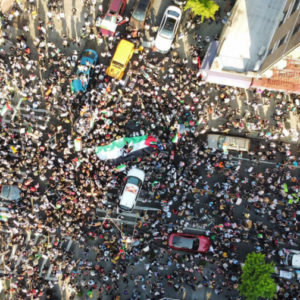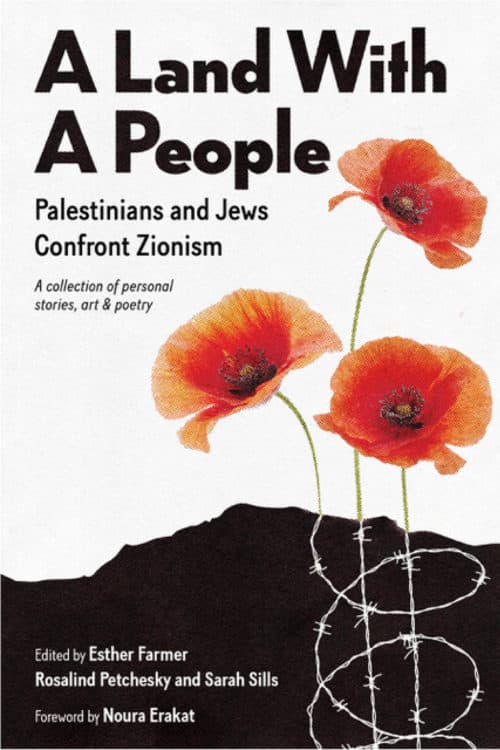Excerpted from the article “Meet the 90-year old Jewish American woman protesting for Palestine,” by Azad Essa, of Middle East Eye
…Most observers agree the narrative has flipped in the US in recent weeks.
Despite the best efforts of many American media outlets to frame Israel’s assault on Gaza as an act of self-defence, tens of thousands have come to multiple cities to demonstrate solidarity with Palestinians. Calls for conditional aid to Israel continue to gather momentum and a critique of Israeli actions has reached the halls of US Congress.
…Jewish Americans number around six million people. The community, 92 percent of whom are white, is considered diverse in political and religious outlook.
Despite the shifts over the past decade, Israel continues to play a dominant role in the make up of the Jewish American identity. In a recent Pew survey published in late May 2021, just 16 percent of American Jews surveyed said that caring about Israel was “not important” to their Jewish identity.
In contrast, 45 percent of American Jews described Israel as “essential” to what being Jewish means, while 37 percent say it is “important, but not essential.” A further 32 percent of Jewish Americans said they believed that God gave the land that is now Israel to the Jewish people.
The survey, conducted in mid-2019 also concluded that younger American Jews were less attached to Israel.
Around 66 percent of those older than 65 said they were very or somewhat attached to Israel, compared to 48 percent of those below the age of 30. According to Pew Research, 37 percent of Jewish Americans below the age of 30 believe the US is “too supportive” of Israel.
Whereas it is difficult to track the attitudinal shifts among older Jewish Americans, with most anecdotal data implying that younger Jews are both more critical of Israel as well as more likely to clash with elder members of their family or community on the issue, long time anti-Zionists aren’t waiting for the boomer generation to change their mind.
“Zionism was racist from the start. I feel a life-long commitment to righting the wrong of settler-colonialism in Palestine. It was our responsibility 70 years ago,” 78-year-old Rosalind Petchesky, a long time member of Jewish Voice for Peace (JVP) and an activist, told MEE.
“The recent Human Rights Watch report is important. The International Criminal Court saying it will investigate potential crimes against humanity is important. At least that is all out there. And it gives those of us, who have for much of our lives, fought as Jews against Zionist settler-colonialism and racism, some tools and weapons. It gives all of us the ability to form a collective movement.”
“To see all of these Jews coming and standing for Palestine. I feel like I finally found my people,” Petchesky said.
Protest and dissent
In attempting to understand the moment, activists and observers say that under former Donald Trump’s presidency, the ambivalence many liberal Americans might have held regarding Israel’s occupation and treatment of Palestinians helped turn their insipidness into all-out embarrassment as Israel, under Prime Minister Benjamin Netanyahu, became Trump’s closest and unabashed ally.
During the Trump years, the US moved its embassy to Jerusalem, the Iran nuclear deal was shelved, and even the prospect of the full annexation of the occupied West Bank became plausible. He also facilitated a number of normalisation deals between Israel and the Gulf states of the United Arab Emirates and Bahrain, as well as with Sudan and Morocco.
But Trump’s open racism, xenophobia, misogyny and courtship of white supremacy galvanised a defiant anti-racism movement in the US that culminated in the resurgence of the Black Lives Matter movement in 2020.
Norman Finkelstein, the Jewish-American political scientist, credits the BLM movement with forcing liberal Americans, including Jews, to rethink their approach to Israel. He describes the influence as “one of those strange concatenations of history.”
“It heightened sensitive to white supremacy, white domination. Now comes along all these reputable mainstream human rights organisations – and they say that Israel is based on Jewish supremacy and Jewish domination – and what does that mean for the liberal community? They can’t support that any more,” Finkelstein, also the author of numerous books, including The Holocaust Industry, told MEE.
“So much has changed, he added.
Sumaya Awad, a Palestinian scholar and activist based in New York City, agrees.
“Seeing a growing movement of unabashedly anti-Zionist Jewish groups is an important and inspiring reminder that these groups are building on a long legacy of Jews who, long before Israel established itself as a settler-colonial state, rejected Zionism and rejected Israel’s ethnic cleansing project.
“Now as the mainstream once again tries to redirect the conversation away from Israel’s crimes against humanity as away from Palestinian suffering, by smearing the movement for Palestinian freedom as antisemitic, it’s especially important for Jewish groups to push back against the weaponisation of antisemitism and to cement the fact that Palestinian liberation is part of the struggle of the oppressed the world over,” Awad told MEE.
“We don’t think Zionism keeps us safe. We believe that safety comes through community and through liberation,” Asaf Calderon, 30, says…..
You can read the rest of the article at MEE


Comments are closed.